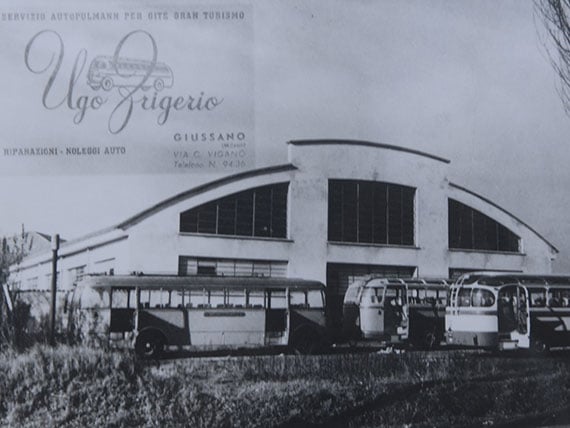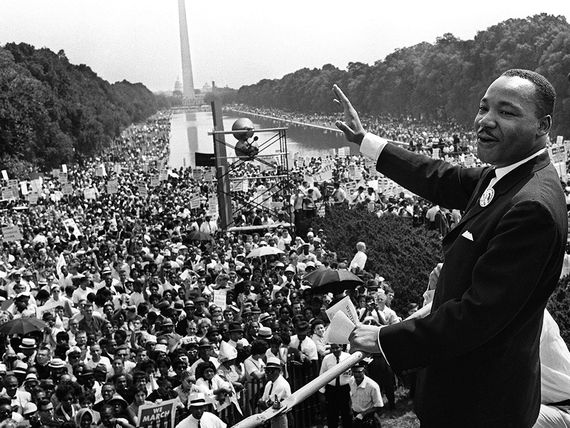
1963/69: during the years of the economic boom the bus fleet is strengthened, Enrica greatly improves the quality and quantity of programs and services offered to customers, and the name already well known in the area for its seriousness and reliability conquers new slices of the market.
Ugo decides to open the first driving school in Giussano and one of the first in all of Brianza, where in addition to teaching ordinary people how to drive cars, he teaches those already licensed to drive buses, keeping the best ones for his company: the company's drivers are always among the most qualified in Brianza and grow under Ugo's teachings and the rigor of his wife Enrica.
Their son Giancarlo attends Accounting School and in parallel with his studies is already involved in the company's work, but Ugo and Enrica see beyond the impending needs and want him to continue his studies. With sacrifice they send him to the Catholic University where he will earn (in 1976) a degree in Economics and Business.
1970/74 Giancarlo marries and in late 1970 Paola is born and in 1972 Simone.
Vacations, as we understand them nowadays, are still not very common: the lucky ones go on “vacation” for months at a time. Many, on the other hand, send their children on vacation “in colony” and visit them on weekends. It increases, exponentially, the demand for tourist services, thanks to the introduction of the “non-working” Saturday. The bus fleet is enriched with new FIAT 343 models, where, in addition to heating, there are the first on-board lounges and air conditioning: strong with these new vehicles Ugo conquers the market for the transport of athletes of the A series and exactly the basketball team Cantù and Milan.
The increase in the demand for tourist services is always constant and with the forecast of the Jubilee in Rome in 1975, Enrica strongly wants the creation of a travel agency that more incisively and constantly supports the activity of the buses: FRIGERIO VIAGGI srl is born.
Ugo decides to open the first driving school in Giussano and one of the first in all of Brianza, where in addition to teaching ordinary people how to drive cars, he teaches those already licensed to drive buses, keeping the best ones for his company: the company's drivers are always among the most qualified in Brianza and grow under Ugo's teachings and the rigor of his wife Enrica.
Their son Giancarlo attends Accounting School and in parallel with his studies is already involved in the company's work, but Ugo and Enrica see beyond the impending needs and want him to continue his studies. With sacrifice they send him to the Catholic University where he will earn (in 1976) a degree in Economics and Business.
1970/74 Giancarlo marries and in late 1970 Paola is born and in 1972 Simone.
Vacations, as we understand them nowadays, are still not very common: the lucky ones go on “vacation” for months at a time. Many, on the other hand, send their children on vacation “in colony” and visit them on weekends. It increases, exponentially, the demand for tourist services, thanks to the introduction of the “non-working” Saturday. The bus fleet is enriched with new FIAT 343 models, where, in addition to heating, there are the first on-board lounges and air conditioning: strong with these new vehicles Ugo conquers the market for the transport of athletes of the A series and exactly the basketball team Cantù and Milan.
The increase in the demand for tourist services is always constant and with the forecast of the Jubilee in Rome in 1975, Enrica strongly wants the creation of a travel agency that more incisively and constantly supports the activity of the buses: FRIGERIO VIAGGI srl is born.
HISTORICAL CONTEXT AND CURIOSITY

In 1963 a factory worker's salary is 86,000 liras per month, a coffee costs 60 liras.
These are delicate years that bring a profound transformation of Italy on the social level, customs and general mentality: living conditions are markedly improved thanks to the economic boom of the previous years, but a period of contestation begins with new movements, especially youth and workers' movements.
In the 1970s some of these political movements became extreme and degenerated into terrorism, initiating the so-called “years of lead.”
On August 28, 1963 Martin Luther King delivered the famous “I have dream” speech, shepherding a symbol of the struggle for black rights. The speech earned King the Nobel Peace Prize in 1964.
On November 22, 1963, John Fitzgerald Kennedy is assassinated in Dallas.
On April 20, 1964, Nutella is born: born as a dessert of the poor, in a short time half the world realizes it can no longer do without, turning Nutella into a social phenomenon that knows no decline.During this period, the completion of major infrastructure gave a turnaround to transportation, especially road tourism. On October 4, 1964, the A1 Milan-Naples, better known as the Autostrada del Sole, was inaugurated: before this day it took as much as 2 days of travel to cover the distance of 755 km between Milan and Naples, now it takes only 8 hours. Instead, on July 16, 1965, the Mont Blanc Tunnel was opened: about 11 km long, it connected Italy and France from Courmayeur (Italy) to Chamonix (France).
On July 20, 1969, man lands on the Moon: American astronaut Neil Armstrong touches the lunar surface and begins a historic walk.
On April 3, 1973, the first phone call is made from a portable cell phone-a historic moment destined to change telecommunications forever, although it took another 10 years before a mobile device was put on the market.
On December 19, 1974, the era of home computers was ushered in when MITS put the first successful pc, the Altair 8800, on sale. This first computer was very different from today's PCs: lacking a keyboard and video, it was a metal box with a series of switches and LED lights, and it did not allow for data storage.
These are delicate years that bring a profound transformation of Italy on the social level, customs and general mentality: living conditions are markedly improved thanks to the economic boom of the previous years, but a period of contestation begins with new movements, especially youth and workers' movements.
In the 1970s some of these political movements became extreme and degenerated into terrorism, initiating the so-called “years of lead.”
On August 28, 1963 Martin Luther King delivered the famous “I have dream” speech, shepherding a symbol of the struggle for black rights. The speech earned King the Nobel Peace Prize in 1964.
On November 22, 1963, John Fitzgerald Kennedy is assassinated in Dallas.
On April 20, 1964, Nutella is born: born as a dessert of the poor, in a short time half the world realizes it can no longer do without, turning Nutella into a social phenomenon that knows no decline.During this period, the completion of major infrastructure gave a turnaround to transportation, especially road tourism. On October 4, 1964, the A1 Milan-Naples, better known as the Autostrada del Sole, was inaugurated: before this day it took as much as 2 days of travel to cover the distance of 755 km between Milan and Naples, now it takes only 8 hours. Instead, on July 16, 1965, the Mont Blanc Tunnel was opened: about 11 km long, it connected Italy and France from Courmayeur (Italy) to Chamonix (France).
On July 20, 1969, man lands on the Moon: American astronaut Neil Armstrong touches the lunar surface and begins a historic walk.
On April 3, 1973, the first phone call is made from a portable cell phone-a historic moment destined to change telecommunications forever, although it took another 10 years before a mobile device was put on the market.
On December 19, 1974, the era of home computers was ushered in when MITS put the first successful pc, the Altair 8800, on sale. This first computer was very different from today's PCs: lacking a keyboard and video, it was a metal box with a series of switches and LED lights, and it did not allow for data storage.

